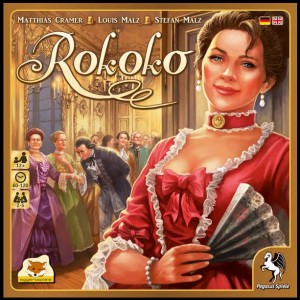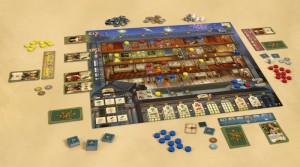Spiel 2013 Preivew: Rokoko
Posted by James (admin) on October 8th, 2013
In Rokoko, players are tailors who are trying to gain the most notoriety at the royal ball of Louis XIV by outfitting the nobles. As you can see from the image of the game (which is what caught my eye in the first place), it’s a Eurogame with quite a lot going on. Plus, it’s by Eggertspiele and Pegasus Spiele so that also drew my attention.
Each round, players take turns taking one of the 6 actions such as gain resources (the different materials required to make outfits), gain patterns (the outfits to be made), hire employees, add a decoration to the ball’s location, etc. Like you would expect from a Eurogame, players are trying to get the resources to make the best items, as well as other aspects, in order to score points.
However, it is not completely straight-forwards as simply picking an action. Each player has a deck of employee cards (and they can hire new ones, and fire existing ones, during the game). Each round, players secretly select 3 of their employees to use from their employee draw deck and they use each employee to perform 1 action. Some actions can only be performed by specific types of employees; for example, the Master tailor can do any action; whereas, the Apprentice tailor can’t make a dress or hire an employee.
Many employees give bonus effects too which are very varied – the back page of rules explains the all and it looks like you can include those as part of your strategy rather than just merely being a nice bonus. Once used, that employee will not return to the draw deck until all employees have performed an action, so there is a slight element of deck-building in this game too.
When taking turns, players need to decide which actions to do first as some actions have specific/limited options. For example, the resources that can be gained are in randomly drawn groups so the group containing the best mix of resources for a player may be gone by the time it is their turn again. The same goes for the dresses to be made. Players can also fund the decorations at the ball (fireworks, musicians, statues and fountains) which all give various bonuses.

When dresses are completed, they can be sold to generate cash, or they can be rented out which means they will be worn at the ball. When rented, they get placed on the board and many spaces give a specific bonus when a dress is placed on them. At the end of the game, points are scored in many ways: Points for the locations where your dresses are located, points for having the majority of dresses in a ha
As you can see from this brief description, there’s a lot going on in Rokoko and it looks to be a solid Eurogame which is more towards the heavy end than the light end. There’s resource management, taking actions in a worker-placement kind of way, area control, and even some deck-building. (I’m sure some manly players may, at first glance, be put off by this theme but I think they’ll be missing out if they are.)ll, points for providing the majority of fireworks, points for people wearing your outfits that get invited to see the fireworks, etc.
You can read the rules and see the details of the game on Eggertspiele’s web site: bga.me/rokoko
James.


